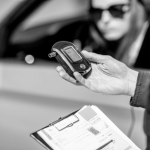On June 23, 2016, the United States Supreme Court issued a decision in Birchfield v. North Dakota. I discussed the issues in this case, and the possible outcomes, back in April. Now we finally have the answers to our long-awaited questions: Is it unconstitutional for law enforcement to request you submit to a blood test without a warrant? How about a chemical breath test?
On Thursday, the U.S. Supreme Court determined that law enforcement cannot obtain a blood sample from an individual for the purposes of a DUI investigation, without first obtaining a warrant. In doing so, the Court based its decision on the analysis of “the degree of which” chemical breath and blood tests intrude upon an individual’s privacy, compared to the degree they are needed for the promotion of legitimate governmental interests.
In short, the U.S. Supreme Court found that under the “search incident to arrest” exception to the warrant requirement, the intrusion of the individual outweighs the government’s legitimate interest in a chemical blood test. When balancing both factors, the Court cited the piercing of an individual’s skin and the generally intrusive nature of blood draws, which outweigh the government’s interest in obtaining the test. Especially, the Court held, when there are an easily accessible and less intrusive means to obtain the blood alcohol contact of an individual: the breath test.
Which, unfortunately, leads us to the breath test. The U.S. Supreme Court held that breath tests do not implicate any significant privacy concerns, do not require piercing the skin, and only entail a minimum of inconvenience. Additionally, they held that human beings have no possessory interest in the air that we breathe. Furthermore, the U.S. Supreme Court found that there is a legitimate government interest in obtaining this evidence, and that implied consent laws for breath tests are incentives to cooperate and serve a very important function. Finally, they cited that there are nearly 1.1 million DUI cases on a yearly basis, and in a state like North Dakota, with only eight judicial districts and 51 total judges (and 31 magistrates), the governmental interest in obtaining warrantless breath tests is much greater than that of blood. Therefore, the U.S. Supreme Court held that law enforcement is not required to obtain a warrant for a chemical breath test.
Lastly, the most important holding by the U.S. Supreme Court in Birchfield, outside of finding that warrantless blood tests are unconstitutional, was that motorists cannot be deemed to have consented to a blood test when they are facing criminal consequences if they refuse. This is important because the current implied consent advisories in both North Dakota and Minnesota inform you that it is a crime to refuse the test. The advisory, and the criminal punishment for refusal, therefore could invalidate consent for a blood draw. Due to this, the legislature in both states could change the law to remove blood testing from the implied consent law, or even possibly remove the criminal consequences of refusal all together.










